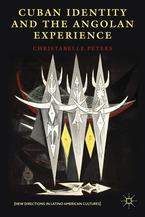"Cuban Identity and the Angolan Experience"
The first “Operation Carlota”
November 5, 1975 marked the 132nd year anniversary of the slave rebellion at the Triumvirato sugar plantation in Matanzas province, led by an enslaved African woman named Carlota. As one of the first acts in her liberation campaign, Carlota, accompanied by her captains, made her way to another plantation, Arcana, where a number of co-conspirators were being held in captivity following an uprising there in August of that year’s incendiary summer, when Africans and their descendants rose up against their enslavers throughout the province. As word spread of Carlota’s successes, one estate after another erupted in insurrection—San Miguel, Concepción, San Lorenzo, and San Rafael. At the same time, the cimarrones organized raiding parties to attack the coffee and cattle estates of the area. Before much time had passed, Carlota and her companions were hunted down by heavily armed troops under orders from the Governor. Within a matter of a few months the rebel leaders were caught, and their pursuers decided to carry out the most horrible execution conceivable, to serve as an exemplary warning and to demonstrate their implacable resolve to dismember the body of revolting slaves—a still-living Carlota was lashed to horses facing in different directions and then drawn and quartered. More than any other facet of her story, it was Carlota’s sense of solidarity—her selfless commitment to the liberation of her fellows—that more than a century later animated the military intervention in Angola, and, indeed, came to symbolize the African component in Cuban identity.
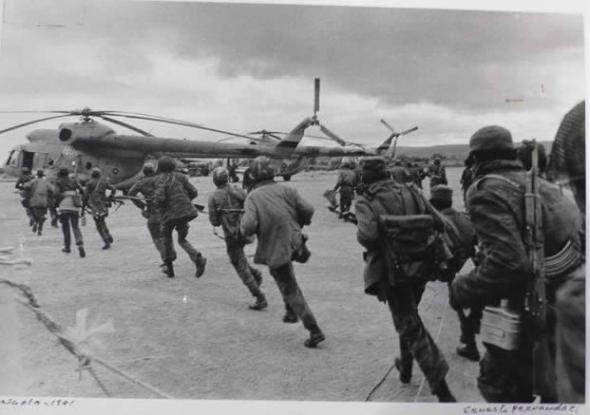 Angola, photo by Ernesto Fernandez
Angola, photo by Ernesto Fernandez
The cult of the ancestors
“The blood of Africa flows abundantly through our veins,” declaimed Fidel Castro at the closing ceremony of the first Congress of the Cuban Communist Party on December 22, 1975. Only seconds before, he had made the unprecedented pronouncement that Cuba was a Latin-African nation, and now the Cuban Prime Minister was seeking to remind his listeners and, above all, his adversaries in Washington, about the roots and responsibilities of those ties of African blood. Coming several weeks after the launch of Operation Carlota, this speech marked the first time that the military mission had been publicly acknowledged, and it introduced metaphorical and spiritual connotations into an internationalist discourse previously painted in harder political tones: “And from Africa, as slaves, many of our ancestors came to this land. And many were the slaves who fought, and many of those who did battle in our nation’s liberation army. We are brothers of Africans, and we are ready to fight on behalf of Africans!” It is difficult to overestimate the emotional depth of force contained in the idea that Cubans harbored a unique, even sacred, biological inheritance which made engagement in Angola’s civil war obligatory, not merely from the standpoint of a moral or political imperative, but even more persuasively, due to the inexorable call of blood to blood. For a society still haunted by the ghosts of a system of institutionalized violence predicated on physiological difference, this poetic re-description of reality promised nothing less than the possibility of a socially restorative atonement. By invoking the national body (“our veins”), Cubans entered the world of myth, where the blood that was shed in history, “the blood that identifies, the blood that is traded, the blood that is spread in war, the blood that is even generated by love,” converges into a mighty river of at-one-ment. Taussig informs us that “in many societies in Asia, Africa, and Latin America it is not a sorcery substance but the spirit of a dead human through which notions of insidedness/outsidedness are staged.” Similarly, the dead slave-ancestor is employed here to mark the perimeters of Cuba’s socio-political body, so that African shared blood becomes indistinguishable from African bloodshed, and as a consequence of this blended blood lineage, all Cubans, irrespective of sociocultural background, may be considered as “brothers of Africans.”
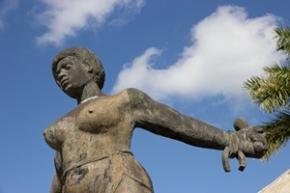 Estátua CarlotaThis cult of the ancestors, like every mythology, is a unifying or harmonizing force, since, as Joseph Campbell reminds, mythology’s role is to integrate “the individual into his society and the society into the field of nature.” In order to accomplish this, myths suggest, on the one hand, the potentialities within a given society, and on the other, “the actuality that hides behind the visible aspect.” The language of myths is the metaphor. With its capacity to coactivate two domains, metaphorical language may transcend the boundaries of time and space. Accordingly, myths may reveal some aspects of social truth only when understood metaphorically. Poetry, as a metaphorical language, trades on the tension of opposites, and thrives on dualism, and it is possible that this dynamic explains its importance during a society’s liminal phases. This may, in turn, partially account for the high status bestowed upon poets in some colonial and postcolonial societies engaged in political processes of unification, as chapter five illustrates in relation to Cuba-MPLA solidarity.
Estátua CarlotaThis cult of the ancestors, like every mythology, is a unifying or harmonizing force, since, as Joseph Campbell reminds, mythology’s role is to integrate “the individual into his society and the society into the field of nature.” In order to accomplish this, myths suggest, on the one hand, the potentialities within a given society, and on the other, “the actuality that hides behind the visible aspect.” The language of myths is the metaphor. With its capacity to coactivate two domains, metaphorical language may transcend the boundaries of time and space. Accordingly, myths may reveal some aspects of social truth only when understood metaphorically. Poetry, as a metaphorical language, trades on the tension of opposites, and thrives on dualism, and it is possible that this dynamic explains its importance during a society’s liminal phases. This may, in turn, partially account for the high status bestowed upon poets in some colonial and postcolonial societies engaged in political processes of unification, as chapter five illustrates in relation to Cuba-MPLA solidarity.
All the same, what remained after Castro’s metaphorical immolation of the nation’s slaving past in his symbolic incantation of the rites of ancestor worship was the “hard bone” of Cuba’s race relations. In the face of claims made by U.S. Secretary of State Henry Kissinger and other members of the Ford administration that the Cuban mission in Angola was a Soviet war-by-proxy, and that, therefore, Cuban objectives were to be regarded with suspicion, the Castro government experienced a certain urgency to put forward the counterclaim that it was only once the South African army had entered Angolan territory, with the tacit approval of the United States, that the decision had been made to send troops. South Africa, as the bastion of apartheid, was much despised by the newly-independent African nations. So, in view of the nation’s history of African enslavement, it was intensely important for the Cuban government to establish a clear dividing line between the past and the present: to demonstrate not only that the legislative structures of institutionalized racism had been dismantled, but that the Revolution had also demolished the structures of feeling associated with the old racist ideology.
There used to be discrimination in our country. Who doesn’t know? Who doesn’t recall? In many parks, over here the Whites and over there the Blacks. Who doesn’t recall that in many places, recreation centers, schools, they wouldn’t let the descendants of Africans in? Who doesn’t recall that there was discrimiation in education, in work, in all walks of life? And who today are the representatives, the symbols of the most hateful, the most inhuman form of discrimination? The fascists and racists of South Africa. And the Yankee imperialists, without scruples of any kind, dispatched mercenary troops from South Africa to crush Angolan independence, and they are outraged that we support Angola, and they are outraged that we defend Africa. Duty-bound by our principles, our ideology, our convictions and our blood, we shall defend Angola and we shall defend Africa!
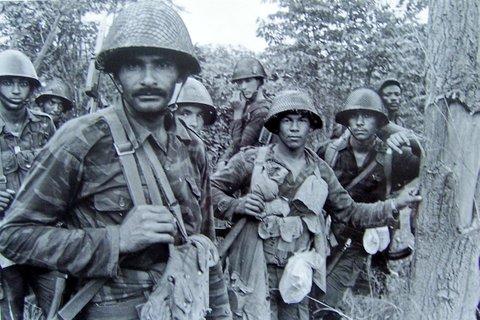 Cuban soldiers, photo by Ernesto Fernandez
Cuban soldiers, photo by Ernesto Fernandez
The first thing we should note here is the confession of past transgressions accompanied by an appeal for all Cubans to share in an act of collective remembrance through repetition of the phrase, “Who doesn’t recall?” Use of the impersonal imperfect tense (“there was,” “there used to be”) imparts the sense of continually repeated practices by anonymous antecedents in an imperfect (in the sense of a blemished or defective) past. Then, abruptly, we are wrenched away from the sordidness of long ago and brought into the present time with the question, “And who today are the representatives, the symbols of the most hateful, the most inhuman form of discrimination?,” conjoined immediately to the declarative response that South Africa and the United States persist in the odious practices of institutionalized racism, thus transferring the locus of blame away from the Cuban sphere. However, it is only with the shift to the future tense— “we shall defend” —coupled to the promise that Cubans will give their own blood for the Angolan cause, that the final transmutation is complete. In other words, the declaration that Cubans—especially the positional descendants of slave owners—are willing to sacrifice themselves for black Africans (the human group considered the most debased) purged antagonistic feelings of fear and pity at the same that it bore rhetorical witness to the complete transcendence of the country’s racist past.
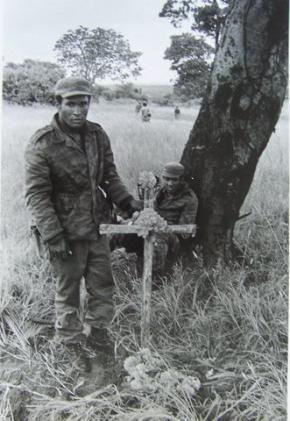 Angola Burial, by Ernesto FernandezIn a sense these words perform a seven veils dance of concealment and revelation, by which I mean that the simultaneous remembering and forgetting of Cuban history illuminates past racism whilst obscuring enduring personal and cultural links with the perpetrators of that racism. Only the shameful present-day racialists—the United States and South Africa—are named, which is further evidence that we are now in the territory of myth, because, as Joseph Campbell explains, this is a common element of sociologically oriented mythologies: “That is to say, love and compassion are reserved for the in-group, and aggression and abuse are projected outward on others. Compassion is to be reserved for members of your own group.” From this point of view, we might say that by referring to Cuban racists indirectly, in other words, by revealing their deeds whilst concealing their identities, Castro was enacting the type of compassion that Campbell had in mind. In this manner, by returning slaveowners to the fold, the history of racism in Cuba is reinscribed as social myth, and any leftover traces of racist deeds from the past can be washed away by the present and future shedding of Cuban blood. (Chapter 4, Rituals of War)
Angola Burial, by Ernesto FernandezIn a sense these words perform a seven veils dance of concealment and revelation, by which I mean that the simultaneous remembering and forgetting of Cuban history illuminates past racism whilst obscuring enduring personal and cultural links with the perpetrators of that racism. Only the shameful present-day racialists—the United States and South Africa—are named, which is further evidence that we are now in the territory of myth, because, as Joseph Campbell explains, this is a common element of sociologically oriented mythologies: “That is to say, love and compassion are reserved for the in-group, and aggression and abuse are projected outward on others. Compassion is to be reserved for members of your own group.” From this point of view, we might say that by referring to Cuban racists indirectly, in other words, by revealing their deeds whilst concealing their identities, Castro was enacting the type of compassion that Campbell had in mind. In this manner, by returning slaveowners to the fold, the history of racism in Cuba is reinscribed as social myth, and any leftover traces of racist deeds from the past can be washed away by the present and future shedding of Cuban blood. (Chapter 4, Rituals of War)
Excerpt from Cuban Identity and the Angolan Experience (New York: Palgrave Macmillan, 2012) by Christabelle Peters
